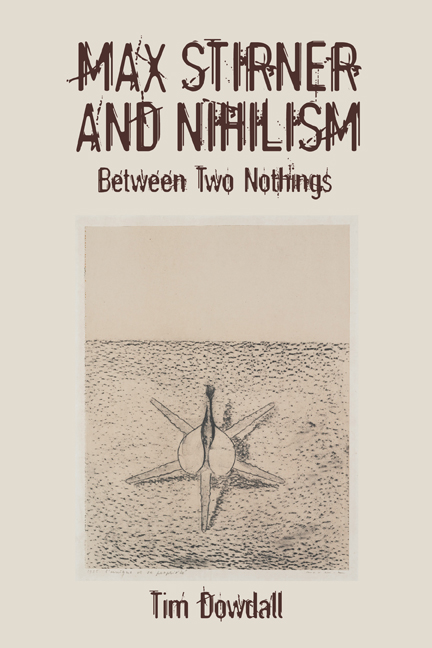Book contents
- Frontmatter
- Dedication
- Contents
- Acknowledgments
- Notes on Sources, Abbreviations, Translations, and Spelling
- Introduction: Stirner: Sinner or Saint?
- Chapter 1 The Origins of Disrepute: Stirner in Context
- Chapter 2 The Meaning of Nothing: Nihilism’s Complex Etymology
- Chapter 3 The Tragic Age for Europe: Nihilism from Nietzsche to Now
- Chapter 4 The Use and Abuse of Nihilism: Stirner under Fire
- Chapter 5 The State of Denial: Stirner and Political Nihilism
- Chapter 6 The Absence of Absolutes: Stirner and Moral Nihilism
- Chapter 7 The Fear of Nothing: Stirner and Existential Nihilism
- Conclusion: Stirner: The Happy Nihilist?
- Bibliography
- Index
Introduction: Stirner: Sinner or Saint?
Published online by Cambridge University Press: 09 May 2024
- Frontmatter
- Dedication
- Contents
- Acknowledgments
- Notes on Sources, Abbreviations, Translations, and Spelling
- Introduction: Stirner: Sinner or Saint?
- Chapter 1 The Origins of Disrepute: Stirner in Context
- Chapter 2 The Meaning of Nothing: Nihilism’s Complex Etymology
- Chapter 3 The Tragic Age for Europe: Nihilism from Nietzsche to Now
- Chapter 4 The Use and Abuse of Nihilism: Stirner under Fire
- Chapter 5 The State of Denial: Stirner and Political Nihilism
- Chapter 6 The Absence of Absolutes: Stirner and Moral Nihilism
- Chapter 7 The Fear of Nothing: Stirner and Existential Nihilism
- Conclusion: Stirner: The Happy Nihilist?
- Bibliography
- Index
Summary
Philosophy, in attempting to extend the boundaries of human thought, is inevitably divisive, but few philosophers have polarized opinion as much as Max Stirner (1806–1856). This might be thought remarkable considering the fact that he only published one original fulllength work, Der Einzige und sein Eigentum, but this singular book is so explosive in terms of both its style and substance that the strong reactions it has evoked ever since its publication in 1844 are hardly surprising. More so, perhaps, is how little known it remains despite the interest it has attracted from admirers like Max Ernst, Herbert Read, and Benjamin Tucker, as well as from detractors like Marx and Engels, Martin Buber, and Albert Camus. For his supporters, Stirner's lack of standing has often been a matter of bemusement, a disturbing example of the wasted talent in human intellectual evolution, that has been the lot of so many thinkers in history who, like Stirner, swam against what was, or would become, the prevailing tide. Among other things, this study aims to explain some of the factors that have inhibited the popularity of Stirner's ideas, although, it should be pointed out for those who have followed this discussion in more recent times, the emphasis here is on the incompatibility of those ideas with the broad patterns of human development rather than on advancing a theory of coordinated marginalization.
There has been a recurrent tendency in Stirner criticism over the years to view his thought from the contextual perspective of the commentator rather than of Stirner himself. This applies particularly to the time between 1880 and 1914 that encompassed both the flowering of anarchism and Nietzsche's initial, enthusiastic reception in Germany and beyond, as well as to the broad periods of post–World War II existentialism and late twentieth-century postmodernism. This inquiry, conversely, endeavors to assess the staunchly unpartisan Stirner, as far as is possible, on his own terms and in the light of his own historical and sociocultural environment. It is not, however, a general account of Stirner's life and work, but tackles instead the specific question of the relationship between Stirner's thought and nihilism.
There are several reasons for adopting this particular focus.
- Type
- Chapter
- Information
- Max Stirner and NihilismBetween Two Nothings, pp. 1 - 5Publisher: Boydell & BrewerPrint publication year: 2024

